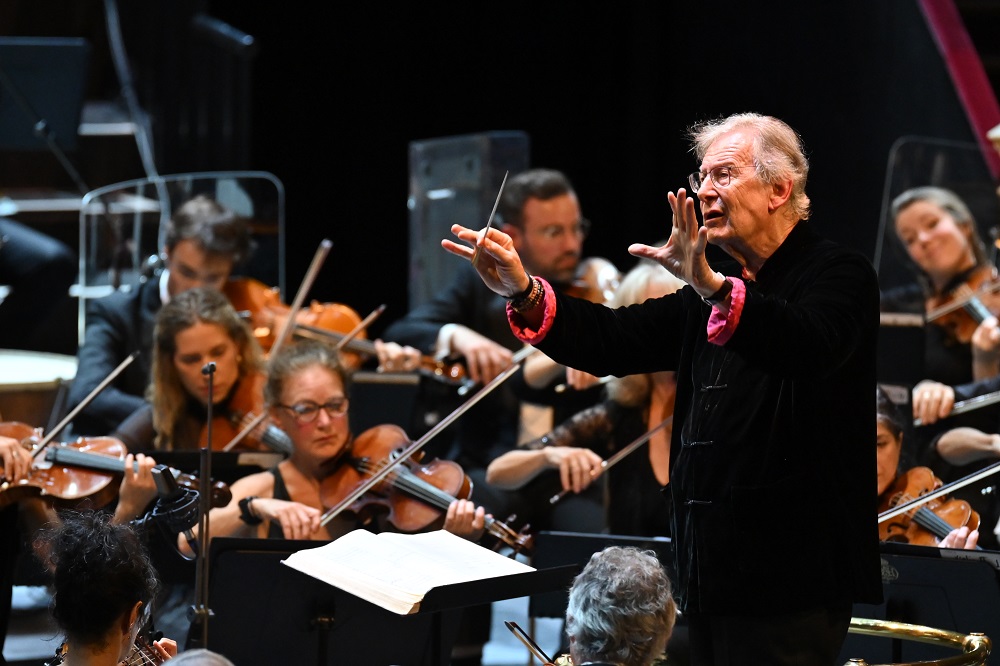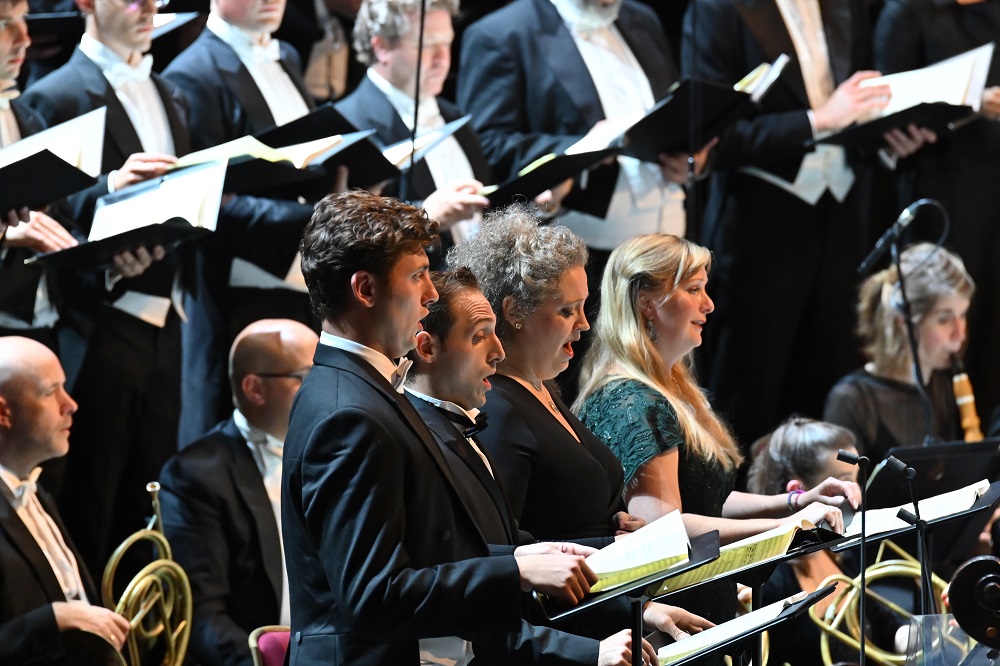Prom 69, Beethoven's Missa Solemnis, Monteverdi Choir, ORR, Gardiner review - shock, fervour and total focus | reviews, news & interviews
Prom 69, Beethoven's Missa Solemnis, Monteverdi Choir, ORR, Gardiner review - shock, fervour and total focus
Prom 69, Beethoven's Missa Solemnis, Monteverdi Choir, ORR, Gardiner review - shock, fervour and total focus
A crazy masterpiece cuts like a knife through Albert Hall haze
Back in 1990, John Eliot Gardiner with his Monteverdi Choir, English Baroque Soloists and world-class singers set the South Bank alight with revelatory concert performances of Mozart’s Idomeneo and La clemenza di Tito. Now he's done it again for an even quirkier masterpiece, burning away any Albert Hall mists with the best possible voices and an “Orchestre” which can be called “Révolutionnaire” but decidedly not “Romantique” when it comes to the Missa Solemnis.
For some of us with blind spots in Beethoven, it’s a hard work to love, except in the serene flow of the solo-violin-led Benedictus. Those full-choral blazes in the Gloria and Credo can seem to go on for ever (and they’re a fearful strain on the voice, as I know from experience). Not, though, when you can whip up such a tempo that only a professional choir of limited numbers is agile enough to deal with it (the whole thing was over in 80 minutes). This Proms season will be remembered, among other things, for a return to big meets of choruses – in Mahler’s “Resurrection” Symphony and Elgar’s The Dream of Gerontius especially – yet it was undeniably refreshing to have this far from quiet yet very focused coda, trumpet-like tenors especially being an asset you don’t usually get in amateur choirs. 
What an amazing list of star players had been assembled in this version of the ORR. Star vocal soloists, too, but beautifully blended when singing together. The wondrous Lucy Crowe always has a special glow in the upper register; in this space, it sounded supernaturally luminous, and she always has an extra stop or two to pull out. Clarion Italianita came from Giovanni Sala, a revelation since I hadn’t heard this loveliest of tenor sounds before. Bass William Thomas and star mezzo Ann Hallenberg made the desperation in the pleas of the “Agnus Dei” sound very human indeed (all four pictured below).
rating
Explore topics
Share this article
The future of Arts Journalism
You can stop theartsdesk.com closing!
We urgently need financing to survive. Our fundraising drive has thus far raised £49,000 but we need to reach £100,000 or we will be forced to close. Please contribute here: https://gofund.me/c3f6033d
And if you can forward this information to anyone who might assist, we’d be grateful.

Subscribe to theartsdesk.com
Thank you for continuing to read our work on theartsdesk.com. For unlimited access to every article in its entirety, including our archive of more than 15,000 pieces, we're asking for £5 per month or £40 per year. We feel it's a very good deal, and hope you do too.
To take a subscription now simply click here.
And if you're looking for that extra gift for a friend or family member, why not treat them to a theartsdesk.com gift subscription?
more Classical music
 Kempf, Brno Philharmonic, Davies, Bridgewater Hall, Manchester review - European tradition meets American jazz
Bouncing Czechs enjoy their Gershwin and Brubeck alongside Janáček and Dvořák
Kempf, Brno Philharmonic, Davies, Bridgewater Hall, Manchester review - European tradition meets American jazz
Bouncing Czechs enjoy their Gershwin and Brubeck alongside Janáček and Dvořák
 Solomon, OAE, Butt, QEH review - daft Biblical whitewashing with great choruses
Even a top soprano and mezzo can’t make this Handel paean wholly convincing
Solomon, OAE, Butt, QEH review - daft Biblical whitewashing with great choruses
Even a top soprano and mezzo can’t make this Handel paean wholly convincing
 Two-Piano Gala, Kings Place review - shining constellations
London Piano Festival curators and illustrious friends entertain and enlighten
Two-Piano Gala, Kings Place review - shining constellations
London Piano Festival curators and illustrious friends entertain and enlighten
 Echo Vocal Ensemble, Latto, Union Chapel review - eclectic choral programme garlanded with dance
Beautiful singing at the heart of an imaginative and stylistically varied concert
Echo Vocal Ensemble, Latto, Union Chapel review - eclectic choral programme garlanded with dance
Beautiful singing at the heart of an imaginative and stylistically varied concert
 Scott, Irish Baroque Orchestra, Whelan, RIAM, Dublin review - towards a Mozart masterpiece
Characteristic joy and enlightenment from this team, but a valveless horn brings problems
Scott, Irish Baroque Orchestra, Whelan, RIAM, Dublin review - towards a Mozart masterpiece
Characteristic joy and enlightenment from this team, but a valveless horn brings problems
 Classical CDs: Voice flutes, flugelhorns and froth
Baroque sonatas, English orchestral music and an emotionally-charged vocal recital
Classical CDs: Voice flutes, flugelhorns and froth
Baroque sonatas, English orchestral music and an emotionally-charged vocal recital
 Kanneh-Mason, Britten Sinfonia, Shave, Milton Court - a grin and a big beaming smile
A pair of striking contemporary pieces alongside two old favourites
Kanneh-Mason, Britten Sinfonia, Shave, Milton Court - a grin and a big beaming smile
A pair of striking contemporary pieces alongside two old favourites
 theartsdesk at the New Ross Piano Festival - Finghin Collins’ musical rainbow
From revelatory Bach played with astounding maturity by a 22 year old to four-hand jazz
theartsdesk at the New Ross Piano Festival - Finghin Collins’ musical rainbow
From revelatory Bach played with astounding maturity by a 22 year old to four-hand jazz
 First Person: Manchester Camerata's Head of Artistic Planning Clara Marshall Cawley on questioning the status quo
Five days of free events with all sorts of audiences around Manchester starts tomorrow
First Person: Manchester Camerata's Head of Artistic Planning Clara Marshall Cawley on questioning the status quo
Five days of free events with all sorts of audiences around Manchester starts tomorrow
 Goldscheider, Brother Tree Sound, Kings Place review - music of hope from a young composer
Unusual combination of horn, strings and electronics makes for some intriguing listening
Goldscheider, Brother Tree Sound, Kings Place review - music of hope from a young composer
Unusual combination of horn, strings and electronics makes for some intriguing listening

Add comment